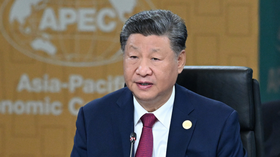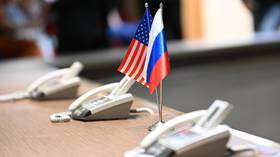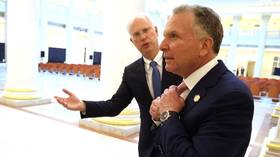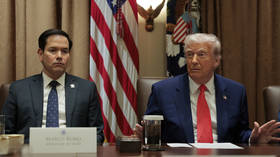Xi reveals Beijing’s four red lines to Biden

Chinese President Xi Jinping has laid out four limits that the US should respect to maintain a balanced and healthy relationship between the two countries.
He stressed that Beijing aims to cultivate a “steady, healthy, and sustainable” relationship with Washington, during a meeting with US President Joe Biden at the Asia-Pacific Economic Cooperation forum (APEC) in Lima, Peru on Saturday.
“As two major countries, neither China nor the United States should seek to remodel the other according to one’s own will, suppress the other from the so-called ‘position of strength,’ or deprive the other of the legitimate right to development so as to maintain its leading status,” Xi said.
He warned against attempting to hold back China’s economic development.
“A new Cold War should not be fought and cannot be won. Containing China is unwise, unacceptable, and bound to fail.”
The Chinese leader stressed it is important for the two countries to treat each other as equals.
Xi acknowledged that while differences between major powers are inevitable, it is essential to respect certain core interests.
The Taiwan question, democracy and human rights, China’s path and system, and China’s development right are four red lines for China. They must not be challenged. These are the most important guardrails and safety nets for China-US relations.
Beijing and Washington can make considerable progress if they “treat each other as partner and friend,” and avoid “vicious competition,” Xi said.
The US officially follows the One-China policy, recognizing Taiwan as part of China despite its self-governance since 1949. However, it engages with Taiwan, sells arms, and pledges military support against possible Chinese attacks, which China sees as a violation of its sovereignty.
China is ready to work with the incoming government of President-elect Donald Trump, the Chinese leader said.
In the course of his election campaign, Trump vowed to pursue an aggressive protectionist policy aimed at securing US economic interests, especially against China.
During his first presidency, Trump engaged in a trade war with China, with both countries imposing tariffs and sanctions. The Biden administration has continued what Trump began in his first term, slapping tariffs on billions of dollars’ worth of Chinese imports in September.
The last meeting between the two leaders took place at the 2023 APEC summit in San Francisco, following the Chinese spy balloon incident. In that four-hour discussion, Biden left early and subsequently called Xi a “dictator” for the second time during a news conference.















